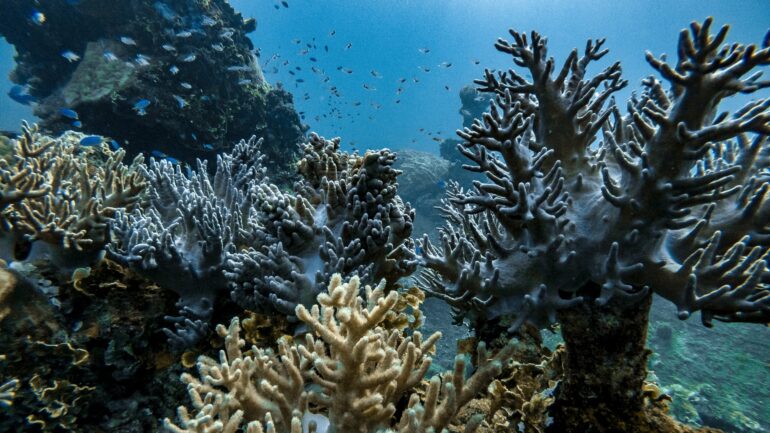The diversity of the Pacific coral reef microbiome—microorganisms which help drive and maintain reef productivity and biodiversity—may approach the current estimated total microorganism diversity on Earth according to new research. The findings, published in Nature Communications and using data collected by the Tara Pacific Expedition during its more than two-year voyage, represent the largest investigation of coral reef microbiome diversity to date, and suggest that the global number of microorganisms may have been significantly underestimated.
Coral reefs are among the most diverse ecosystems on Earth and support 30% of marine diversity including millions of multicellular organisms and associated microorganisms. These microorganisms are a strong indicator of reef health, yet the extent of coral reef biodiversity is unexplored at an oceanic level. Moreover, there is general concern for the future of coral reefs due to the decline of coral coverage as a consequence of climate change.
Pierre Galand and colleagues collected a total of 5,392 samples from three coral species (Millepora platyphylla or fire coral, Porites lobata or lobe coral, and Pocillopora meandrina or cauliflower coral), two fish species (Acanthurus triostegus or convict tang and Zanclus cornutus or Moorish idol), and plankton in 99 different reefs from 32 island systems in the Pacific between 2016 and 2018. These samples were sequenced to determine reef microbiome composition and mapped to record geographic distribution. The authors also measured the temperature, salinity and other environmental characteristics of the water at each sampling site.
The authors report that their samples include 2.87 billion genetic sequences, which is around 25% more than the 2.2 billion samples earlier reported by the Earth Microbiome Project (a global microbiome diversity mapping project). Overall, plankton showed the greatest microbiome diversity. Blade fire coral had the most diverse microbiome among the coral species, while Moorish idol microbiomes were more diverse than those of convict tang. The authors report that the coral microbiomes did not follow the expected pattern of greater diversity in the western Pacific, which is home to a greater variety of coral species than the eastern Pacific. There was also no significant correlation between seawater temperature and microbiome diversity.
A second paper by Alice Rouan, Eric Gilson and colleagues, also published in Nature Communications, investigated the relationship between water temperature changes and telomere DNA length (an environmentally-sensitive marker of health and aging) in two types of reef-building coral. The authors report that seasonal temperature variation affected telomere length in the short-lived and stress-sensitive types of stony coral (Pocillopora), whereas the longer-lived and more robust types of stony coral (Porites) were affected by unusual heat waves and cold periods rather than seasonal variation. This suggests that the telomeres of some corals may respond differently to the effects of climate change.
Two other papers published in Scientific Data, by Fabien Lombard and colleagues and Caroline Belser and colleagues respectively, describe the Tara Pacific sampling methodology and data generation framework.
Together, these papers provide insights into the health and biodiversity of coral reefs across the Pacific Ocean.
The Tara Pacific Expedition is a multi-discipline project exploring the biodiversity of thousands of coral reefs across the Pacific Ocean—more than 100 scientists from 23 institutes across eight countries have contributed. The schooner Tara set out on a two- and half-year voyage to collect samples from more than thirty island systems.
Findings from the expedition are presented in a collection of eight papers published across multiple Springer Nature journals. The full collection is available here.
More information:
Pierre E. Galand et al, Diversity of the Pacific Ocean coral reef microbiome, Nature Communications (2023). DOI: 10.1038/s41467-023-38500-x
Alice Rouan et al, Telomere DNA length regulation is influenced by seasonal temperature differences in short-lived but not in long-lived reef-building corals, Nature Communications (2023). DOI: 10.1038/s41467-023-38499-1
Fabien Lombard et al, Open science resources from the Tara Pacific expedition across coral reef and surface ocean ecosystems, Scientific Data (2023). DOI: 10.1038/s41597-022-01757-w
Caroline Belser et al, Integrative omics framework for characterization of coral reef ecosystems from the Tara Pacific expedition, Scientific Data (2023). DOI: 10.1038/s41597-023-02204-0
Provided by
Nature Publishing Group
Citation:
Two-year voyage finds Pacific coral reef biodiversity is far greater than we know (2023, June 2)



